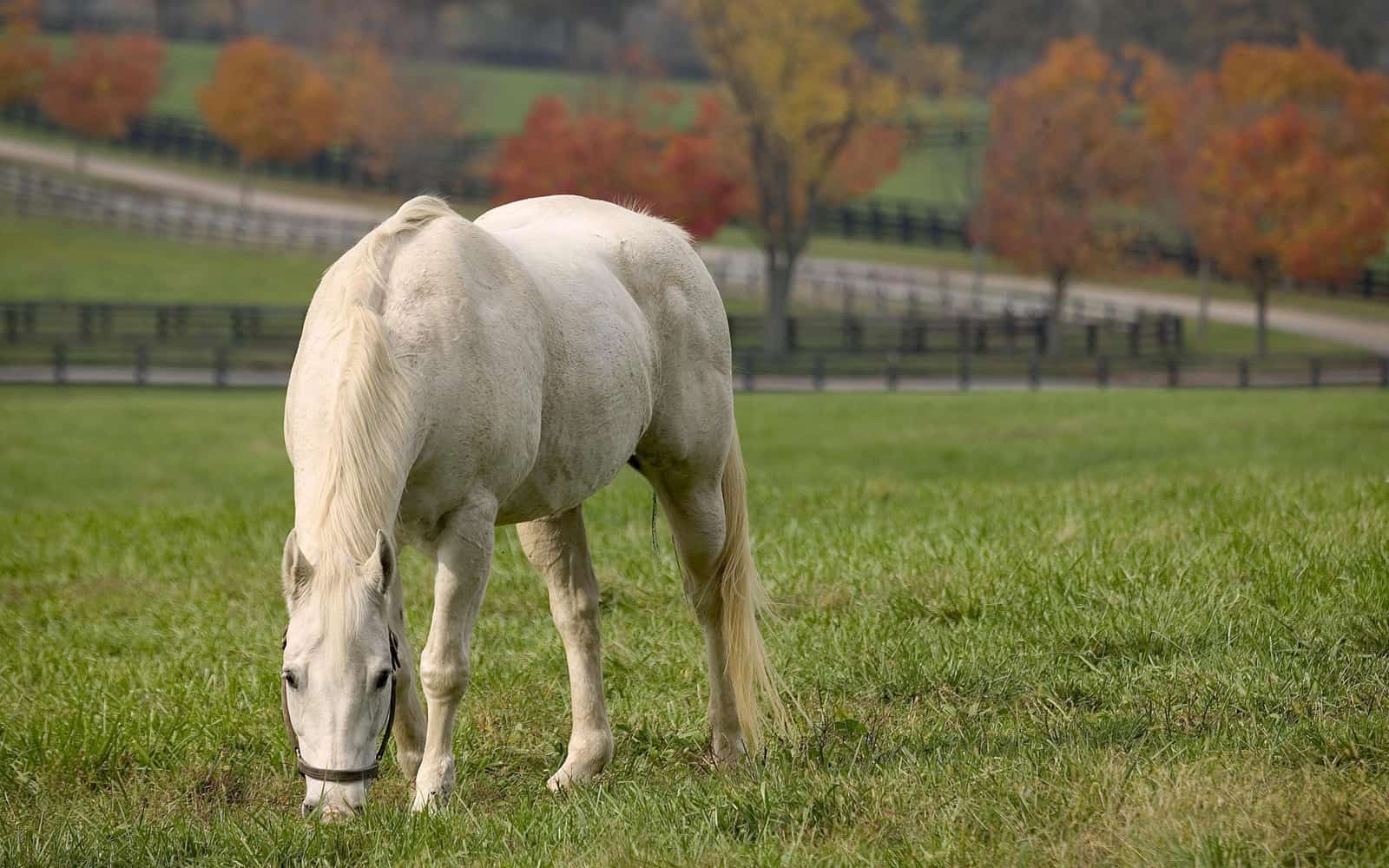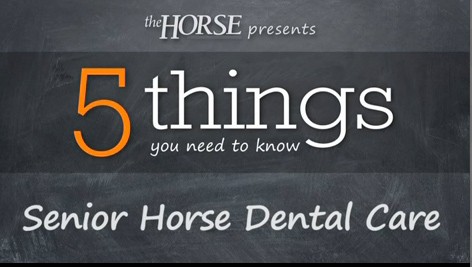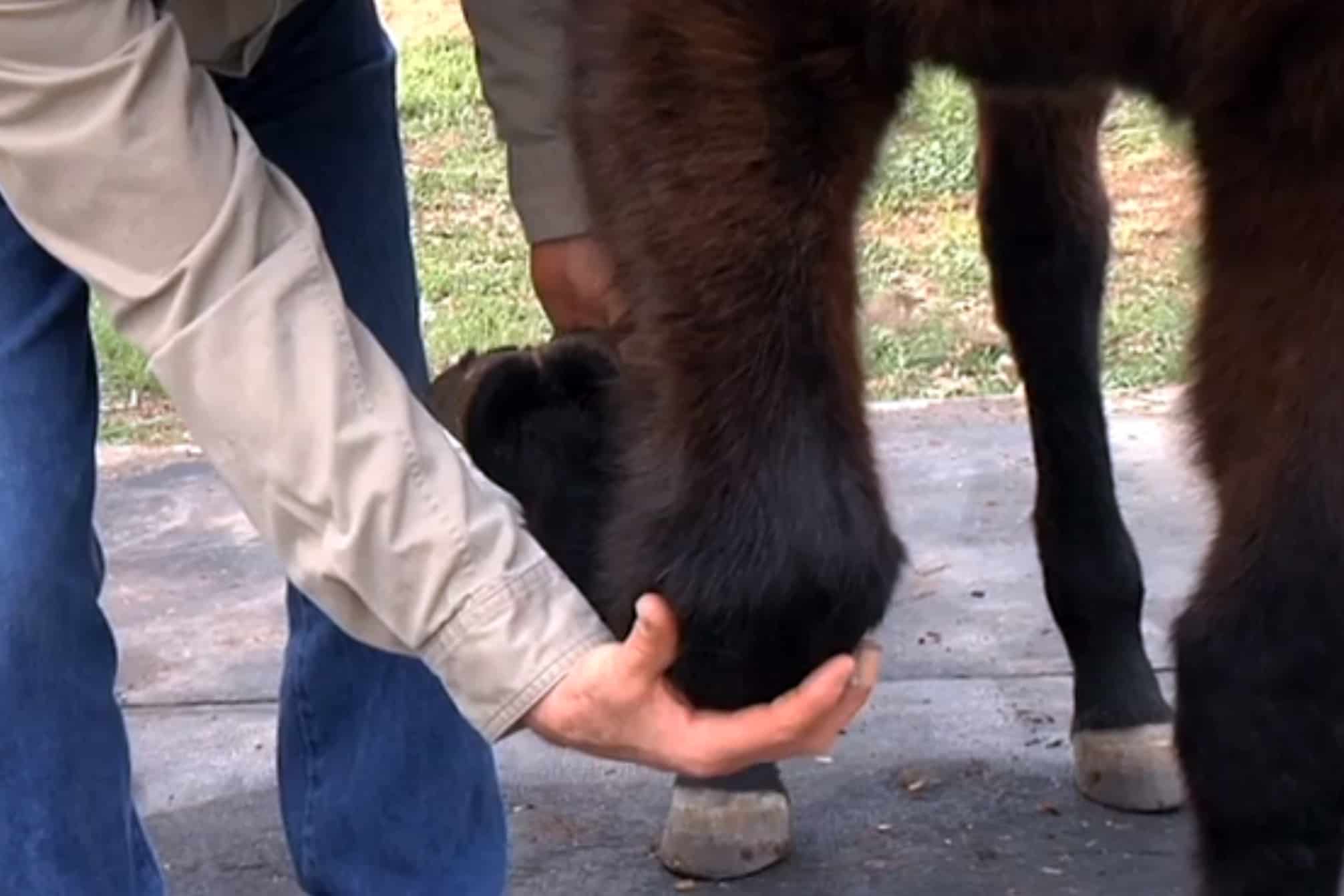Caring for Senior Horses: What to Remember

“Horses are living longer, more productive lives,” said Jeannie Willems, LVT, RVT, BS. “Part of that is the willingness of the horse owner to take better care of their investment, whether it’s a retired racehorse or a faithful old friend.”
Willems, immediate past-president of the American Association of Equine Veterinary Technicians, said education is key to helping owners provide adequate care as their horses age. She offered tips on how to keep senior horses happy and healthy at the 2016 Western Veterinary Conference, held in March in Las Vegas.
How Old is “Old”?
It wasn’t long ago that the 15-year-old horse was considered a senior, Willems said. The general consensus today, however, is that a horse is considered “old” when he reaches 20.
One important point to remember is that not all horses age the same, meaning some will stay “young” well into their 20s while others will start to resemble seniors in their mid- to late teens. Treat each horse as an individual, cater to his specific needs as they appear, and avoid lumping him into a generalized age group based solely on his chronological age.
Horse to Human Age Comparison
| Horse Age | Life Stage | Human Age | Life Stage |
|---|---|---|---|
| 1 | Foal, Weanling, Yearling | 6.5 | Infant, Baby, Toddler, Preschooler |
| 2 | 2-year-old | 13 | Adolescent |
| 3 | 3-year-old | 18 | Teenager |
| 4 | 4-year-old | 20.5 | Young Adult |
| 5 | Physical Maturity | 24.5 | Adult |
| 7 | 28 | ||
| 10 | 35 | ||
| 13 | Middle Aged | 43 | Middle Aged |
| 17 | 53 | ||
| 20 | Senior | 60 | Senior |
| 24 | 70 | ||
| 27 | 78 | ||
| 30 | Extreme Old Age | 95 | |
| 33 | 93 | ||
| 36 | 100 |
Information Courtesy Jeannie Willems, LVT, RVT, BS
Care Considerations
“For the most part,” Willems said, “senior horse care is the same as care for a younger horse, just with more intensity in several areas.” She shared tips on how to best manage those areas to keep the senior horse healthy and happy through his golden years.
Day-to-Day Evaluations
Taking a close look at an older horse each day is an ideal way to stay on top of health concerns ranging from weight loss or gain to injuries or wounds to signs of illness or infection.
“Assessing the condition of a senior horse will help guide the owner to keeping their equine partner happy and healthy,” Willems said. “Daily scrutiny of the horse’s general well-being as well as any new lumps or bumps should be noted as soon as possible to curtail any possibility of infection.”
Establish baseline parameters—If your senior horse comes in from the paddock a bit lethargic one day, you might reach for the thermometer to take his temperature as well as check his pulse and respiration rate. Good choice! But do you have anything to compare those values to?
It’s always a good idea to have record of your horse’s normal temperature, pulse, and respiration rates; weight; and body condition score; these values could help a veterinarian diagnose health problems your horse might develop, Willems said. Your veterinarian can also help you collect additional baseline parameters with a complete blood count and testing liver and kidney enzyme levels and thyroid levels.
Dental Health

You might be accustomed to having your horses’ teeth checked and maintained annually, but consider increasing the frequency of appointments to every six months, Willems said.
“As a horse ages, his teeth change and require attention more frequently,” she said. “The senior horse, ideally, should be at least checked every six months, as sharp edges and hooks on the teeth can be painful and interfere with chewing and proper tongue movement.”
This, she added, can cause the older horse to miss out on nutrients in his feed that help him maintain weight.
Nutrition
Speaking of which, planning an appropriate diet for a senior horse is crucial to maintaining his health. It can also be one of the most challenging things about caring for a senior horse, Willems said. Pasture is, of course, ideal to nourish many horses, young and old. However, whether due to health problems or available resources, it’s not a practical solution for all equids. So many owners must construct a diet based on other forage products and concentrates.
Hay for aged horses should be soft and easy to chew, she said. Avoid selecting a stemmy forage, if possible. Soaking hay can also help make it easier for the dentally challenged senior horse to chew. Other options for horses with few to no teeth left—thus, unable to chew properly and swallow long-stem forage—include hay cubes or pellets (often soaked), chopped hay, or another type of forage, such as beet pulp.
To add calories and nutrients to the diet, consider a commercially available feed designed for senior horses. “Senior feeds are formulated to meet the specific needs of the older horse, taking into consideration the wear and tear on the teeth that has occurred over a lifetime,” Willems said. “These feeds are designed to be easier to chew, swallow, and digest than other adult feeds, and the nutrients are more readily available to the horse’s system to get the maximum benefit from the feed.”
If a horse is unable to consume any forage, consider a complete feed designed for seniors, which usually contain “enough roughage and added fat to meet the older horse’s fiber and calorie requirements with little to no added grass or hay,” she added.
Some senior horses can also benefit from supplements being added to their diets, Willems said. Omega-3 fatty acids, for example, have been shown to decrease inflammation in some cases, but aren’t found in all commercial feeds. So, adding a supplement containing omega-3s could prove beneficial for your horse. Consult your veterinarian or an equine nutritionist to determine whether your aging horse requires a supplement, and what type they’d recommend to best help your horse.
Body Condition
If you’re one of the lucky ones, your aging equid’s weight won’t fluctuate very much. However, weight loss and gain are common in old horses (generally not in the same senior horse, though!). Weight loss can be caused by a variety of factors from poor dentition, inadequate nutrition, excessive worm burdens, an underlying disease process, or simply becoming more passive in nature. Weight can also result from different issues, including fat replacing lean muscle when the workload decreases and insulin resistance development. Monitor your horse’s body condition regularly to catch any changes early and take appropriate action.
Vaccinations
Your older horse might be retired, but he still needs the same protection from vaccines he’s received his entire life. Willems said research suggests that older horses’ bodies might have a harder time developing an antibody response to disease challenges, but more work is needed before veterinarians can recommend vaccinating seniors any more frequently than mature adult horses.
“Until then, routine vaccinations—including ones for rhinopneumonitis (respiratory equine herpesvirus-1), equine influenza, Eastern and Western encephalomyelitis, tetanus, West Nile virus, and rabies—should be given as usual,” she said.
Deworming
“Deworming for the aged equid should be base first on need, as indicated by fecal egg counts to determine which anthelmintic (deworming medication) is required,” Willems said. These are the same recommendations most veterinarians offer for adult horses, meaning you likely won’t change much on the deworming front as your horse ages. Consult your veterinarian if you have questions about your individual senior’s circumstances.
Hoof and Joint Health
Willems encouraged attendees to pay close attention to seniors’ hooves and joints, as potentially life-threatening conditions can develop rapidly.

“Hooves should be cleaned out daily, as well as the lower legs and hooves examined for signs of heat that may indicate things such as laminitis, arthritis, or injuries to tendons and ligaments,” she said.
Regular and proper trims from a qualified farrier can help older horses remain comfortable, and can help reduce excess strain on joints and other internal structures.
Meanwhile, Willems noted that arthritis is common in senior horses. “These horses can do better being turned out to allow more movement so as to prevent the joints from becoming stiff and keeping them lubricated,” she said.
Some older horses can also benefit from a supplement to promote joint health or an anti-inflammatory medication to reduce pain and swelling. Consult with your veterinarian to determine which, if either, option is right for your horse.
Shelter
We know it’s important to provide horses with shelter, but it’s crucial to ensure older horses have protection—be it a barn, a run-in shed, or a cluster of trees—from the elements. Senior horses have reduced thermoregulatory abilities (meaning they have a harder time keeping themselves cool or warm in summer or winter, respectively) compared to adult horses, so it’s up to the owner to ensure the aging equid stays comfortable year-round.
Diseases and Conditions
“Senior horses are more susceptible to numerous diseases and conditions simply due to growing older,” Willems said. Common conditions in seniors include:
- Pituitary pars intermedia dysfunction (PPID or equine Cushing’s disease);
- Thyroid gland tumors;
- Insulin resistance;
- Equine metabolic syndrome;
- Colic;
- Cancer;
- Eye issues, such as cataracts;
- Arthritis; and
- Heaves or other respiratory conditions.
She noted that diet and exercise can help counteract the effects of some conditions, as can veterinarian-prescribed medications in some cases.
Quality of Life
Ensuring a good quality of life should be every horse owner’s goal, Willems said. Unfortunately, there often comes a time when a senior horse no longer has that quality of life, perhaps due to accumulating health conditions. At that point, the most humane option for the older horse might be to allow him to depart with dignity.
“The American Association of Equine Practitioners (AAEP) has set euthanasia guidelines that can help with this emotional and difficult decision for the horse owner,” Willems said.
The AAEP considers “humane euthanasia of animals … an ethical veterinary procedure.” The association’s euthanasia guidelines state that:
- “A horse should not have to endure continuous or unmanageable pain from a condition that is chronic and incurable;
- A horse should not have to endure a medical or surgical condition that has a hopeless chance of survival;
- A horse should not have to remain alive if it has an unmanageable medical condition that renders it a hazard to itself or its handlers;
- A horse should not have to receive continuous analgesic medication for the relief of pain for the rest of its life; and
- A horse should not have to endure a lifetime of continuous individual box stall confinement for prevention or relief of unmanageable pain or suffering.”
If an owner can’t decide what’s right for a particular horse, a veterinarian or vet tech can be hugely helpful in assessing the realistic options for the animal, Willems said.
A sodium pentobarbital overdose is the most common method of euthanasia, Willems said, and recent research has shown that it’s a quick, painless, and humane way to end a horse’s life. She cautioned that some areas don’t allow horses euthanized via a drug overdose to be buried due to potential environmental contamination.
Other methods of euthanasia include a gunshot or a captive bolt. Both result in instantaneous death, Willems said; however, she stressed, they must be placed correctly and proper technique must be used.
“The next consideration is the disposal of the remains, which can depend on budget, area resources, and personal preference of the horse owner,” she said. Common options include burial, composting, and cremation, among others.
Take-Home Message
Horses are living longer than ever thanks to nutrition and veterinary advancements, along with a better understanding of how to manage them. Using your veterinarian and vet tech as resources for ensuring your older horse has everything he needs can help keep him happy and healthy through his golden years.

Written by:
Erica Larson
Related Articles
Stay on top of the most recent Horse Health news with












